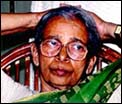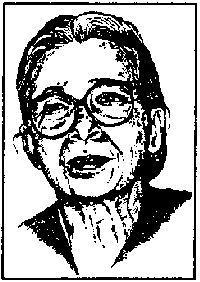|
Times of India, 5 January 2000, p. 14 Badge of All Their Tribes
You have spent decades working for tribals. Why do you feel the need for greater awareness today, especially among the university goers? I would go so far as to urge a special provision in the University for learning about them. For, unless the academicians and the elite of society start learning about the tribes and support their rights, the tribals' yearning to get a dignified place in India will never be fulfilled. Until that happens, I will use every possible forum to sensitise people about the de-notified tribes and communities. It is now more than a year since the All India De-Notified Tribes and Communities Right Action Group was set up. But few recognise them as living creatures. As Namwar Singh said at a Delhi University function, "All these years I have lived in Delhi, I have never spared a thought for the Kanjars, Bawarias, Pardhis, Sasis..'' But for the major crimes committed in the Capital, they are victimised. What is more crucial, when they need all the understanding and protection, they are being shown on TV channels as the most wanted criminals. How did the Group come about? I have been working for the tribes of Bengal for three decades. Last year when Budhan, a member of the Shabar tribe I am connected with, was killed, I filed a PIL in the Calcutta High Court. The responsible police officers were suspended, a CBI inquiry is on and the widow was awarded a compensation of Rs 1 lakh. Naturally, when I was asked to deliver the Verrier Elwin Memorial lecture in Baroda last year, I spoke about the denotified tribes. It led to the setting up of the Denotified and Nomadic Tribes and Communities Right Action Group. Marathi writer Lakshman Gaekwad is the vice president and G N Devy is the secretary of the Group which brings out a bulletin named Budhan. How many such tribes are there today? There are more than 200 tribes and communities, with the population numbering between 5 and 6 crore. The nomadic ones cannot vote because of police persecution and constant wandering about. The British had notified them in 1871 as Criminals and passed the Criminal Tribes Act, though not all were tribes -- some were simply castes. The Government of India denotified them in 1952, but in 1959 passed the Habitual Offenders Act. It is a repetition of the Act of 1871, with minor change of words. So now, they are oppressed by both, the police and society. Haven't the societal changes of the past decade changed their lifestyle and their status? Not really. Because all the development schemes initiated for the Scheduled Castes, Scheduled Tribes and Other Backward Castes, are not applied to them. Therefore, at the age of 75, I am desperate. I urge the government to bring all of them under a general category, De-Notified Communities. This DNC should include all SCs, STs and OBCs, but can have a subplan for the nomadic ones. They can be brought into the fold of development by giving land, facilities of education, health. Women's development can be made possible under Indira Awas Yojana. Non-formal vocational training centres can be opened. Above all, I appeal to the media not to project the police version alone but to go and make enquiries on their own and write field reports on their real condition, so that people understand the reality. Had they been such big criminals, they would not have lived in such abject poverty. Why do the police pick on them for crimes? In 1952, when they were denotified, the police and the receivers of stolen goods kept them engaged in criminal activities. For many such communities, crime is the only way to survive. Otherwise they suffer persecution, both by the police and society. But they continue to live in dehumanised conditions everywhere, whether in the metropolises or in the remote villages. I speak from personal experience. I have seen about 60 Lodhas and Shabars of West Bengal being killed for either theft or dacoity, but not a single receiver of stolen goods has been brought to book. The situation in Maharashtra and Madhya Pradesh is much worse; Delhi is no better. On December 3, policemen from the Baramati Police Station killed three sleeping Pardhis and grievously injured four persons. Two of these were women. I cannot help but ask, again and again: Why do the big swindlers and power wielders go unpunished? Why do these communities pay the price all the time? How has your tryst with tribals influenced your literature? It is not new for my literature to spring from a fight for the rights of these oppressed and downtrodden people. The tribal revolt against the British at the turn of the century formed the backbone of Aranyer Adhikar, which the Sahitya Akademi had singled out for their awards. My social activism is the driving force of all my literary activities, be it literature -- which brought me into the good books of Jnanpith -- my newspaper columns or the journal I edit, with writing by members of different tribes. The lives of the bonded labour provided me with a character like Dopadi. Perhaps their stories also impart a narrative immediacy to my language. And the Magsaysay? Was it for your art or activism? In the words of the award council, it was "for her compassionate crusade through art and activism to claim for tribal peoples a just and honourable place in India's national life.'' But in the recent months your activism seems to have completely taken over your literature? I did write three stories and novelettes in July. But then I had a stroke which forced me to rest. This is the first time since then that I have stepped out of Calcutta. I have come only to make our thinkers and policy makers see the reality of the denotified tribes. I had gone to Bhopal for a seminar on the subject. It was also the focus of my talk at the Delhi University. And it will take up every waking hour of my stay in Baroda, the head quarters of the Group. Back to the top. |
 ||
Ideas and Writings on South Asia ||
||
Ideas and Writings on South Asia ||

